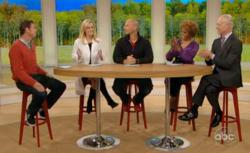As the world turns, daytime television ceases to spin on the axis of the soap opera. Almost precisely 40 years ago, Renata Adler opened a television column in The New Yorker by gaping at the “extremes of hatred and loneliness” played out on The Doctors, a racy alternative to General Hospital then working through a plot line about “an educated man so bitter that he kills himself solely to frame another man for murder.” The noonday demon frolicked, and the show, Adler wrote, was “an epic of despair.” That sort of death no longer has a place in the afternoon. The TV Doctors on call in 2012 is a syndicated Dr. Phil spinoff where physicians and psychologists wearing scrubs or lab coats mix smoothies that promise to improve your orgasm.
Such is the atmosphere that The Revolution (ABC, weekdays at 2 p.m. ET) entered when it debuted on Monday, replacing One Life To Live and seeking to fill an Oprah-shaped void (though without delving too deeply into trauma or cracking open so many novels). On ABC’s schedule, the show immediately follows The Chew, which replaced All My Children in September. On The Chew, a gang including Mario Batali, Top Chef graduate Carla Hall, and second-generation self-help guru Daphne Oz convenes for a big-tent cooking show whisking together celebrity chat, game-show gamboling, makeover magic, and many encouraging shoulder rubs. The food is a pretense and almost a fig leaf for the show’s attempts at refreshing Oprah’s self-help vocabulary. That there are too many cooks in the kitchen does not spoil the desired vibe. When Paula Deen, the TV chef who recently announced her diabetes diagnosis, was a guest on Wednesday, she performed a down-home lyric about resisting despair: “I’ve always been the kind of person to overcome adversaries.”
The Revolution echoes The Chew in format, temperament, and design sense. Indeed, I am interested to know exactly what astounding sum of money these shows paid to their color consultants. (Where The Chew goes in a Granny Smith green redolent of fresh starts and easygoing eco-friendly affluence, The Revolution uses that tone as an accent color but favors a nourishing orange, as if to suggest that every afternoon is a dawn.) And like its lead-in—or like the Justice League or S.H.I.E.L.D. or the Traveling Wilburys—The Revolution gathers a sort of supergroup.
First among equals is Ty Pennington, the host of Extreme Makeover, who kicked off the series with a mission statement. Count the yous in this sentence: “You now have one hour a day dedicated to giving you simple, straightforward tips and tools that will empower you to live the life you’ve always dreamed of.” Here and throughout, Pennington seethed with rugged sensitivity. The beaded necklaces beneath his open collar, the touch of fuzz beneath his lip—these suggested a contractor who will do your custom kitchen and then you, parting with a kiss on the forehead. By contrast, Tim Gunn, the taskmaster and den mother on Project Runway, is an avuncular presence—and also an index of the degree to which the spirit of the Bravo network now haunts and animates all lifestyle programming.
Then there are Dr. Jennifer Ashton and Dr. Tiffanie Davis Henry. It’s easy to remember that Dr. Jennifer is an M.D. (“your partner in health”) and Dr. Tiffanie is a therapist (“your mental-health maven”) because Dr. Jennifer only doffs her white coat on special occasions, as when casually demoing the workouts suggested by “celebrity trainer” Harley Pasternak. The aggregation of these attractive chatterers suggests a perfection of synergy—the apotheosis of the formula that George W.S. Trow laid out in Within the Context of No Context: “Only an expert can deal with problems. Only an expert or a pleasant man on television with access to experts. … In the age of no-authority, these are the authorities.”
On Wednesday, the Revolutionary leaders brought their various talents to bear on the topic of breasts. Here was Tim Gunn, standing in a space tastefully emblazoned with a Macy’s product placement, to address such sartorial horrors as “Peek-A-Boolia” and “Side Boob.” “Never show your bra straps,” Tim intoned. “Frankly, ladies, it’s vulgar.” (Yes, but what if vulgarity is the goal?) Dr. Jennifer, talking sensibly (and non-alarmistly) about health, had occasion to say, “People forget about the nipples.” (Au contraire, but whatever; Dr. Jennifer suggested applying honey to them for nonrecreational reasons.) Harley found it necessary to state that you cannot, through exercise, increase your bust, a matter I thought had been settled years ago by the acclaimed researcher Margaret Simon. In any case, Harley led three civilians, one each in her 30s, 40s, 50s, through back and arm workouts that would create the illusion of a larger bust, which is just as good, if that’s your thing. One among the experts addressed the rampant problem of ill-fitting support garments with the rhetorical panache of Johnny Cochran: “If it doesn’t fit, you need to quit.”
The show’s tagline states that “It’s About You”—as if the tenor of a media culture founded on boomer narcissism, developed by Gen-X navel-gazing, and oozing swiftly forward fueled by millennial exhibitionism had somehow left the point unclear. It’s about You—your budget, your diet, your dreams, your pantsuits. One element of the show finds The Revolution’s cameras following “heroes.” You can get to be a hero by facing deep fears or by working hard to lose weight. You can also become a hero by wearing, in Tim’s words, “a heel that gives you a longer, leaner silhouette.” This revolution is velvet like an Ann Taylor blazer.
